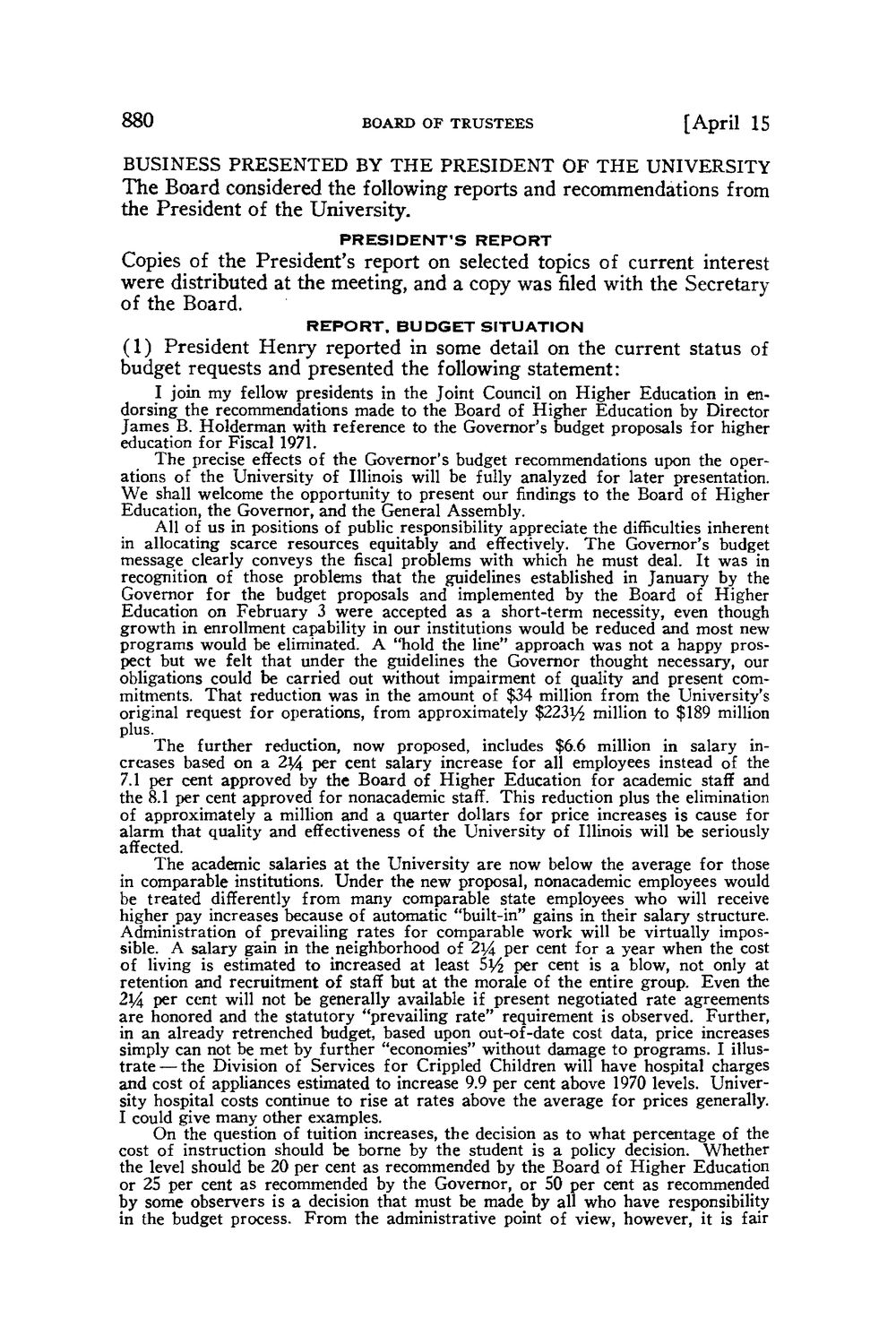| |
| |
Caption: Board of Trustees Minutes - 1970
This is a reduced-resolution page image for fast online browsing.

EXTRACTED TEXT FROM PAGE:
880 BOARD OF TRUSTEES [April 15 B U S I N E S S P R E S E N T E D BY T H E P R E S I D E N T O F T H E U N I V E R S I T Y The Board considered the following reports and recommendations from the President of the University. PRESIDENT'S REPORT Copies of the President's report on selected topics of current interest were distributed at the meeting, and a copy was filed with the Secretary of the Board. REPORT. BUDGET SITUATION (1) President Henry reported in some detail on the current status of budget requests and presented the following statement: I join my fellow presidents in the Joint Council on Higher Education in endorsing the recommendations made to the Board of Higher Education by Director James B. Holderman with reference to the Governor's budget proposals for higher education for Fiscal 1971. The precise effects of the Governor's budget recommendations upon the operations of the University of Illinois will be fully analyzed for later presentation. We shall welcome the opportunity to present our findings to the Board of Higher Education, the Governor, and the General Assembly. All of us in positions of public responsibility appreciate the difficulties inherent in allocating scarce resources equitably and effectively. T h e Governor's budget message clearly conveys the fiscal problems with which he must deal. It was in recognition of those problems that the guidelines established in January by the Governor for the budget proposals and implemented by the Board of Higher Education on February 3 were accepted as a short-term necessity, even though growth in enrollment capability in our institutions would be reduced and most new programs would be eliminated. A "hold the line" approach was not a happy prospect but we felt that under the guidelines the Governor thought necessary, our obligations could be carried out without impairment of quality and present commitments. That reduction was in the amount of $34 million from the University's original request for operations, from approximately $223V^ million to $189 million plus. The further reduction, now proposed, includes $6.6 million in salary increases based on a 2}4 per cent salary increase for all employees instead of the 7.1 per cent approved by the Board of Higher Education for academic staff and the 8.1 per cent approved for nonacademic staff. This reduction plus the elimination of approximately a million and a quarter dollars for price increases is cause for alarm that quality and effectiveness of the University of Illinois will be seriously affected. The academic salaries at the University are now below the average for those in comparable institutions. Under the new proposal, nonacademic employees would be treated differently from many comparable state employees who will receive higher pay increases because of automatic "built-in" gains in their salary structure. Administration of prevailing rates for comparable work will be virtually impossible. A salary gain in the neighborhood of 2i4 per cent for a year when the cost of living is estimated to increased at least 5V$ per cent is a blow, not only at retention and recruitment of staff but at the morale of the entire group. Even the 2i4 per cent will not be generally available if present negotiated rate agreements are honored and the statutory "prevailing rate" requirement is observed. Further, in an already retrenched budget, based upon out-of-date cost data, price increases simply can not be met by further "economies" without damage to programs. I illustrate-— the Division of Services for Crippled Children will have hospital charges and cost of appliances estimated to increase 9.9 per cent above 1970 levels. University hospital costs continue to rise at rates above the average for prices generally. I could give many other examples. On the question of tuition increases, the decision as to what percentage of the cost of instruction should be borne by the student is a policy decision. Whether the level should be 20 per cent as recommended by the Board of Higher Education or 25 per cent as recommended by the Governor, or SO per cent as recommended by some observers is a decision that must be made by all who have responsibility in the budget process. From the administrative point of view, however, it is fair
| |